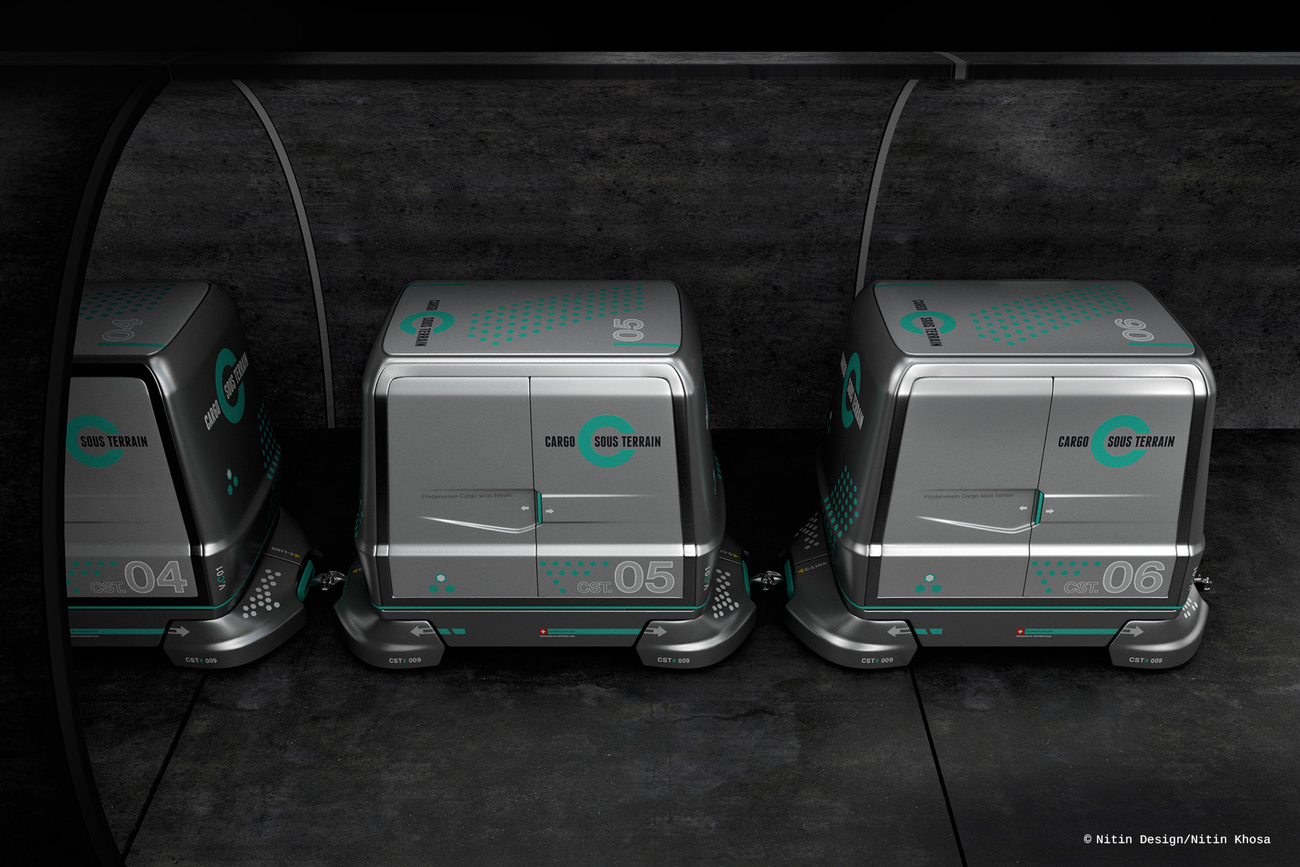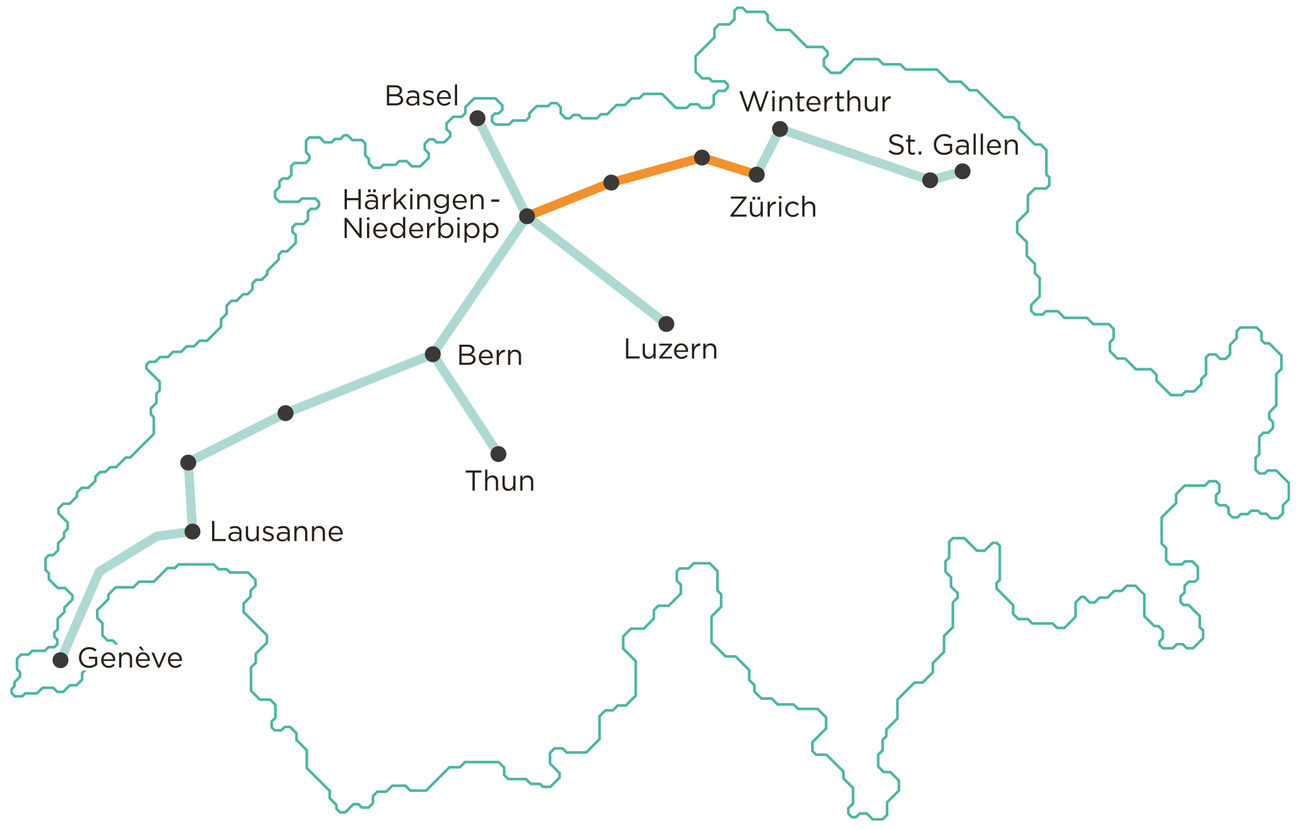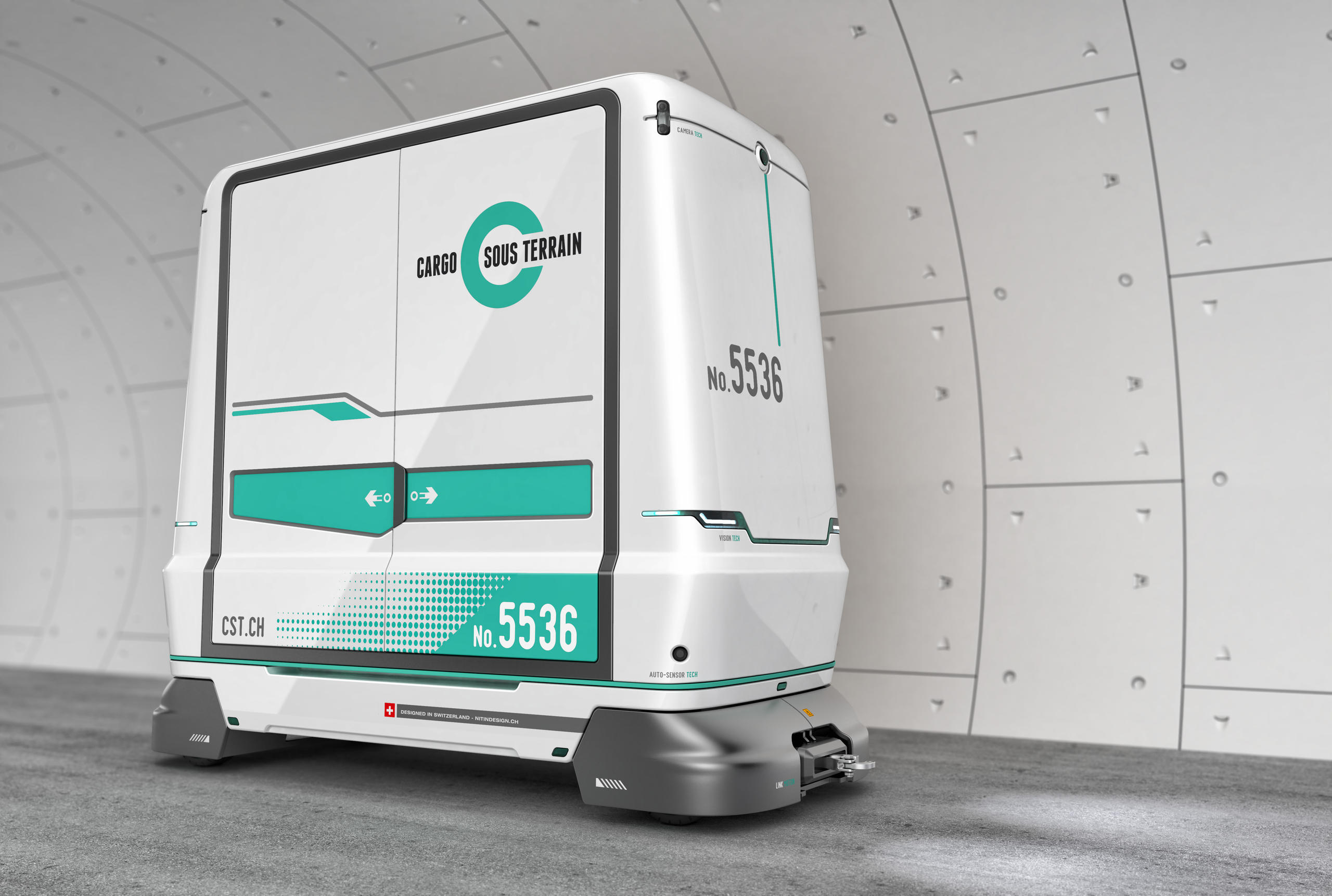
Future freight: Swiss underground mega-project slowly picks up speed

A decades-long project in Switzerland to get transport trucks off the road and replace them with a vast underground network of self-driving pods is attracting media attention abroad. Exploratory work is moving ahead and the operator Cargo sous terrain insists the first series of tunnels will be ready by 2031.
The story of building an underground freight system in Switzerland is one of patience and imaginative thinking. First proposed in 2013 by a public limited company of the same name, Cargo sous terrain (Underground Cargo, CST) had to wait eight years before the Swiss parliament approvednew legislationExternal link for construction, which came into effect in August 2022.
This year, though, began promisingly for CST. In January it launched exploratory drilling and geological measurements to help it precisely plan the first stretch of tunnels between Zurich and Härkingen in canton Solothurn, situated 70 kilometres to the west. The company has also been holding talks with residents and communities along this route where hubs for loading and unloading goods are planned. But it still needs to secure planning permissions from the various cantons.
Confident about 2031 target
The Härkingen-Zurich line will be part of a proposed 500km-long network of tunnels between Geneva and St Gallen, which go down to a depth of 40 metres. Electrically powered self-driving pods riding at a constant 30km/hour and capable of transporting two pallets each will ferry goods between hubs along the network.

The entire project is estimated to cost CHF30-35 billion ($33-39 billion), to be raised entirely from the private sector. CST says it has secured CHF100 million so far for the first phase of the project. The Härkingen-Zurich line alone is expected to cost around CHF3.4 billion. The legislation explicitly excludes the federal government from any financial liability for the project.
Concerns have been raised about the price tag and the ability of the private sector to raise this huge sum – and potentially more, if it runs over budget. The information portal Heidi.newspointed outExternal link that the project was approved “at a time of negative interest rates. Will it withstand rates of 2% or 3%,” it wondered. CST did not reply to a SWI swissinfo.ch request for comment.
CST wants the 70-km stretch between Härkingen and Zurich to be operational by 2031. Reaching this goal should be possible, CST recently told Swiss public radio SRF. The broadcaster notedExternal link that the Lötschberg Base Tunnel, which cuts through the Bernese Alps and is half as long, took eight years to build. But CST believes that, since it will be drilling on relatively flat land, the process should be quicker: around three-and-a-half years.
This year CST unveiled a prototype for a “vertical lifter” that will move the pods between the hubs and the tunnel. No similar device currently exists on the market, says CST.

More
Futuristic underground cargo project moves a step closer to reality
Once the first phase is successfully completed, the operator aims to finish the rest of the network by 2045.
Fewer emissions
The aim of the futuristic underground project is to shift freight from Switzerland’s ever-busy roads. Currently, cargo in Switzerland is mainly transported overlandExternal link: two-thirds by road and the rest by rail. Road cargo transport is projected to increase by over 30% by 2040, compared to 2010 figures, Swiss authorities say.
The gains from building an underground system will be reduced traffic congestion and fewer road accidents, CST says in its latest environmental impact assessmentExternal link. If, once goods arrive in cities, CST bundles them for delivery by electric vehicles, traffic could be eased on urban roads too.
CST points to a study by the Zurich University of Applied Sciences, which reportedly shows that using the tunnel and bundled delivery services would reduce the daily mileage of transport trucks in the city of Zurich by a quarter. CST is currently involved in a “smart parcel” trial in Zurich that is designed to cut down on delivery vehicles on the road by offering parcel lockers for pick-ups.
Significantly reduced carbon emissions are also on the cards. Overall, the network would emit less pollution than current diesel-powered transport trucks, CST says.
“It’s doubtful that it’s more environmentally friendly to drill 500km of tunnels than to put trucks on the road that in the long run will be powered by electricity,” Heidi.news remarked.
CST, however, says that its environmental footprint would be smaller in the long run, even with electric and hydrogen-powered cargo vehicles on the roads – and, CST spokesperson Patrick Aellig told CNNExternal link, even when taking into account emissions from the construction work. The electricity powering the automated pods will be sourced from renewable energies.
Global interest in underground transport
Recently, a Japanese mobility tech news portal published an in-depth report on the Swiss project. Japan’s main cities are constantly grappling with congestion, and authorities have been exploring the use of underground routes for nearly two decades, including one for a logistics tunnel in the Tokyo area, Jidounten Lab reportedExternal link.
Other countries, such as Germany, the Netherlands and China, are also considering underground transport projects.
One author of a feasibility study on underground cargo transport in the United States told CNN that CST has the potential to reduce both traffic and pollution, as highways around the world become more congested. Whether the Swiss underground cargo system will be ready on time, and within budget, and deliver on all its environmental promises remains to be seen.

In compliance with the JTI standards
More: SWI swissinfo.ch certified by the Journalism Trust Initiative





























You can find an overview of ongoing debates with our journalists here . Please join us!
If you want to start a conversation about a topic raised in this article or want to report factual errors, email us at english@swissinfo.ch.